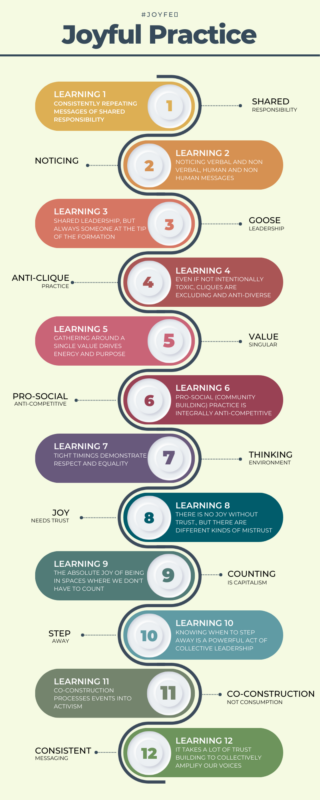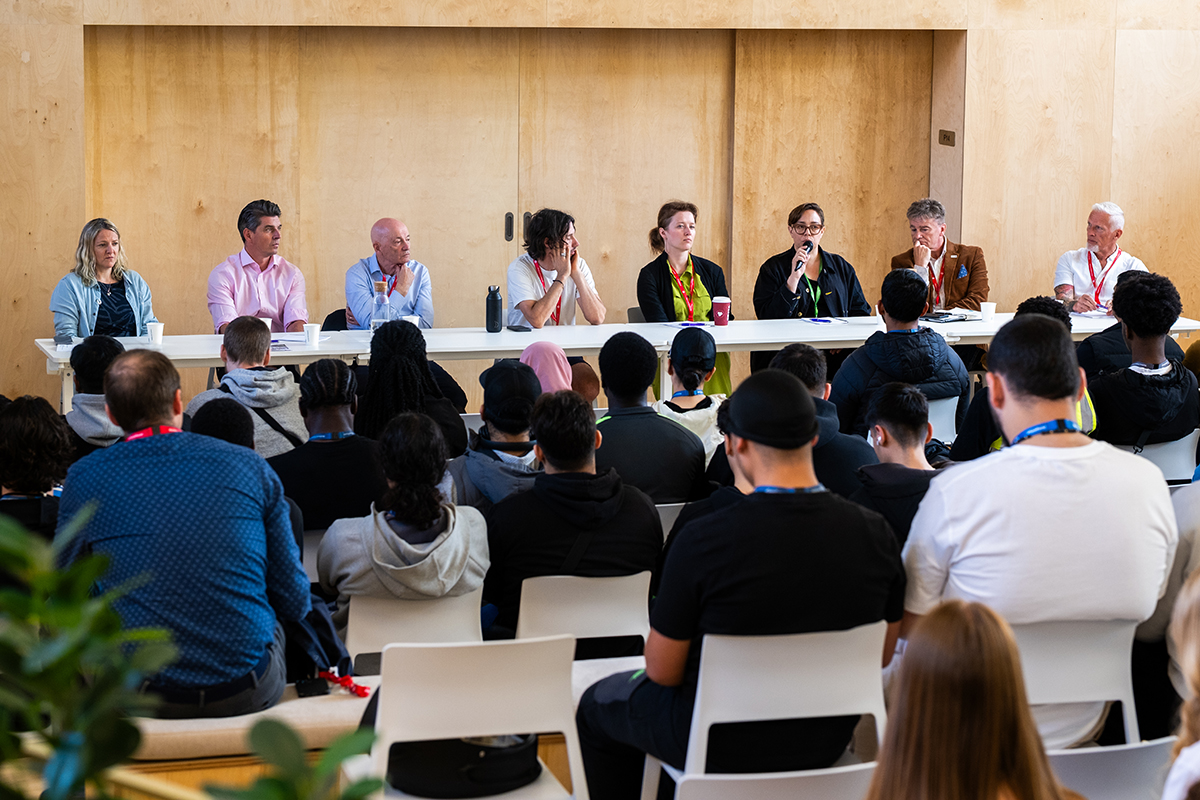JoyFE – Learning from the Rhizome

In the five years since we co-founded #JoyFE we have learned so much. We are very practical in FE, but what felt like a spontaneous moment on the first day of lockdown actually came from years of wading in the philosophy of values, particularly joy. Which makes it sound more like a plan than it actually was…I guess what really happened for me was that everything I’d been composting in my brain, as part of a PhD I felt barely on top of, bubbled up to the surface and the hashtag #JoyFE was born.
Stef Tinsley’s was the idea of what to do – the TwitterLive on that first strange day. My role was to pour all of my learning into that tiny hashtag #JoyFE. The five year anniversary of all of that feels like a good moment to reflect on what we learned.
We were always deliberately part of the FE landscape, yet outside the control of any organisation that even a minor sponsorship might imply. Aside from passing a hat round to raise funds for a pro Zoom account each year, money was not involved. We wanted to be rhizomatic – bluebells on the forest floor of the FE ecosystem – and we still are. Far too many of us to dig up now and the joyful hashtag is still doing its work. It’s a different operating system to what we are used to in FE and we always felt that we could get to places where the CPD sun didn’t shine. And we learned so much!
Three years in, we were asked to join a Raise the Roof! session at the LSRN conference, perfect for us! There were plenty of bluebells in the room who had contributed to the infographic I presented.

Learning 1 – Shared Responsibility
This was a tough one, because we are all institutionalised into command-and-control hierarchies. But the liberties of early lockdown gave us a freedom to think differently. It took a while for Stef and myself to not be seen as ‘the leaders’ but it was important to keep reiterating this message, so that initiatives could spark up without having our energy or ‘permission’ behind them – such as Sinéad Blackledge’s weekly #JoyFE playlist, Fab Friday FM. We can share responsibility in rhizomatic/bluebell spaces where we are linked by a value – joy. And that makes everyone equally powerful – and responsibile. There was an expectation that everyone would get involved in something.
Learning 2 – Noticing
From the very start, we were noticing. Connecting differently as we did with the outside world and with each other online, we noticed verbal and non-verbal cues that we hadn’t before. This is long before the time when ‘cameras off so I can check my emails’ became a CPD default. We were noticing one another and in doing so we were noticing systems glitches and cultural friction and fixing them where we could. And we were noticing the non-verbal cues of the outside world too.
Learning 3 – Goose Leadership
This was such a powerful metaphor for #JoyFE. When geese fly in that remarkable V it’s not always the same goose – or group of alpha geese – at the front. They take leadership in turns. Sometimes a concept or metaphor is all that’s needed for a mindset change and this is what turned Learning 1 around for us. Oh – and when a goose is tired or injured, two or three others drop down to accompany them. We did this too 😊
Learning 4 – Anti-Clique Practice
We very quickly started to become a clique, sharing in-jokes and using words like ‘newbie’ (which is a total clique alert!) at the start of sessions, such as the Ideas Rooms. Luckily, Learning 2 meant that we quickly noticed and put a stop to it by having some clear, kind (and radically candid) conversations amongst ourselves. Of course it was unintentional. But that didn’t make it less excluding.
Learning 5 – Value Singular
The value – of joy – was baked in from the start and it’s the thing we gathered around. Simply that. Not ‘like minded’ people (who wants to hang out with people who think the same as you?) but literally ‘like valued’. The temptation to design a set of values was there in the early days – part of what we assumed happened in organisations I guess – but we held out and that allowed joyful practice to shine.
Learning 6 – Pro-Social (and anti-competitive)
Pro-social (community building) practice is integrally anti-competitive and we like to think that – along with FE’s other grassroots communities that you can find in the AmplifyFE Sector Audit and on the map – #JoyFE has made a contribution to anti-competitive practice through our pro-social approach. Working pan-organisationally is important, to keep ideas fresh and also to energise (with changemaking potentia) individuals who might get a little stale in the midst of the day job and organisational politics.
Learning 7 – The Thinking Environment
We cannot emphasise enough the importance of the Thinking Environment to #JoyFE’s work. At the start of lockdown, this set of processes for enabling independent thinking was still largely untested online. We had to notice what did and didn’t work and tweak the process, introducing (for example) the ‘How Are You?’ opening question (thanks to Lindsey Wilson), which we use in our individual practices to this day. Some recent work I’ve been doing around neuroscience and the Thinking Environment speaks to why this practical approach meant (still means) so much, to clear space for thinking in a time of overwhelm – and provided the means for ‘equal as thinkers’ connection.
Learning 8 – Joy Needs Trust
To work in this joyful, rhizomatic way takes trust, because we relinquish classic modes of control. But there are different kinds of mistrust, some of which we carry with us from negative work experiences – the fear of making a mistake, for example. The sense that there’s always somebody else ‘in charge’, or waiting to trip you up. We found that adopting generous assumptions and seeking out common ground if we mistrust someone could only happen if we listened closely to one another.
Learning 9 – Counting is Capitalism
It was so liberating not to have to count, because we didn’t have targets! As a rhizomatic movement, we were unanchored from capitalism’s demands. So we were free to follow the energy of our initiatives. It helped that we made a firm decision – with a few early wobbles – that #JoyFE would never be commodified. There was no bank account. So we didn’t have to (ac)count.
Learning 10 – Step Away
Perhaps the biggest lesson of collective leadership is knowing when to step away. We stopped with the #JoyFE magazine when it wasn’t joyful any more. We ended the Ideas Rooms when people didn’t want to meet in an evening, once they were physically back at work. And recently we took the decision to close down #JoyFE’s social media – the concept is out there now, in the bluebell woods. If the energy for any of these – or something new – returns, we (or someone else) will pick up the threads again.
Learning 11 – Co-Construction (not consumption)
#JoyFE was about creating and sharing things together. If you came to a #JoyFE event expecting to sit back and consume, you’d be disappointed. Our Thinking Environment approach compelled everyone to play a part – and of course everyone found they had something to offer. In this way, we (and others) challenged the prevailing view of CPD and – we truly believe – the culture of professional learning in FE.
Learning 12 – Consistent Messaging
It takes a lot of trust-building to consistently amplify our simple, single message around joyful practice. It’s not about branding (because we didn’t have anything to sell); everyone who participated was encouraged to use the #JoyFE hashtag, to connect and grow community. Learning to gently challenge and encourage was a key skill of the goose leadership.
Maybe there are lessons in all of this for the ‘first operating system’ of FE, the line management hierarchy which ensures that the FE cart is kept on the wheels. We are so good at this kind of operation.
But as the ETF’s recent research with Oxford Saïd Business School evidenced, FE has a dual purpose, for which a single operating system won’t do any more. The #JoyFE experience has lessons for the development in each organisation of a ‘second operating system’, which drives momentum around the major social purpose issues of our days.
By Dr Lou Mycroft, Green Changemaker










Responses